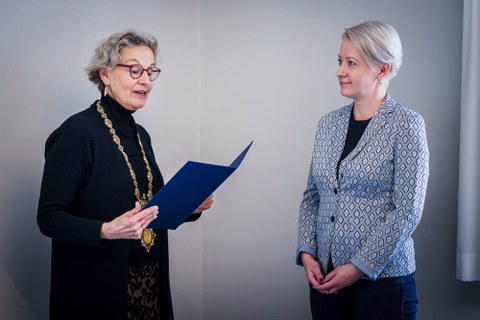Apr 11, 2024
Dr. Maria Fedorova appointed as W2 Professor and Chair of Lipidome Research at ZML Dresden
Dresden, April 11, 2024
Dr. Maria Fedorova has been appointed as Professor and Chair of Lipidome Research at the Center of Membrane Biochemistry and Lipid Research (ZML), effective January 1, 2024.
Dr Fedorova's academic journey began with Biochemistry undergraduate studies at the St Petersburg State University, followed by a PhD at the Institute of Bioanalytical Chemistry, University of Leipzig. Driven by a fascination with mass spectrometry and its potential to unravel molecular complexity, Dr Fedorova shifted her focus from the redox regulation of proteins to lipids. Recognizing the pivotal role of lipid modifications in redox and metabolic signaling, Dr. Fedorova led a research group at the Center for Biotechnology and Biomedicine in Leipzig. Here, she made notable advances in the application of lipidomics, ultimately leading to the conceptualization of the term "epilipidome" – a subset of the natural lipidome shaped by enzymatic and non-enzymatic lipid modifications, required to regulate complex biological functions.
Dr. Fedorova's appointment as professor at the ZML is an important strategic and long-term initiative to reinforce Dresden's 20-year legacy of excellence in lipid research. Using state-of-the-art mass spectrometry and bioinformatics methods, her research group investigates the intricate mechanisms of lipid quality control at the subcellular, cellular and organismal levels. Dr. Fedorova is particularly focused on unraveling the lipidome remodeling processes in metabolic, degenerative and malignant diseases, shedding light on crucial aspects of lipid biology with implications for human health.
Dr. Fedorova's dedication to science is further evidenced by her role as Vice Chair of the Pan-European Network in Lipidomics and Epilipidomics (COST Action EpiLipidNET), a vibrant community of researchers dedicated to advancing lipid biology and lipidomics technologies. She is also the coordinator of the BMBF consortium FERROPath, which focuses on elucidating the pathomechanisms of ischemia-reperfusion injury.
When asked about her decision to join the ZML in Dresden, Dr. Fedorova underlines the importance of the Dresden scientific community in the international lipid research scene.
"I came to TUD two years ago. And one of the main reasons was the long history of lipid research and lipidomics in Dresden. Importantly, on the TUD campus we have a very strong focus on metabolism, both from a basic and biomedical perspective. This provides a vibrant environment and greatly supports the interdisciplinary nature of the research. Lipidomics gives us the amazing opportunity to look deep into the molecular making of life. As exciting as this is, it is not enough to understand the biology behind it, nor to explain the pathological complications in biomedical research. And the interdisciplinarity of biomedical research is exactly the strength and the focus here in Dresden in general and at the Center of Membrane Biochemistry and Lipid Research in particular".
About TU Dresden
Dresden University of Technology (TU Dresden) is one of eleven German Universities of Excellence, esteemed for its exceptional standards in research and teaching spanning diverse fields. The Faculty of Medicine at TU Dresden is dedicated to propelling medical science and healthcare forward through interdisciplinary collaboration and pioneering research.
About ZML
The Center of Membrane Biochemistry and Lipid Research (ZML) is a research unit of the Medical Faculty Carl Gustav Carus of the TU Dresden. Its mission is to foster basic lipid research and membrane biochemistry for a fundamental and systematic understanding of the molecular basis of metabolic diseases and cancer. The research center integrates analytical, biochemical, biophysical, computational and structural methods to understand lipid function, dysfunction and interaction with other molecules.

